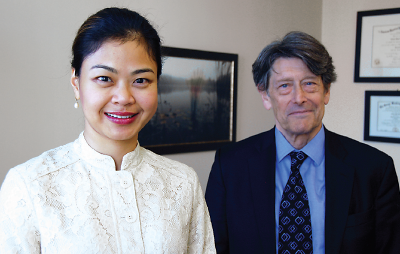One of the world’s more insular nations began opening itself up in recent years, a development that is starting to have a significant effect on its mental health system.
Myanmar, the country formerly known as Burma, is slowly shaking off the effects of decades of military rule and isolation. In the process, psychiatry departments from several U.S. universities are helping it build bridges to the outside world.
Myanmar (then Burma) received its independence from Britain in 1948, but a military coup in 1962 led to shutting down most relations with the rest of the world for decades. Restrictions were loosened somewhat after the military government was formally dissolved in 2011. Myanmar has since taken cautious steps toward democracy, with a parliamentary election scheduled for later this year.
The country of 50 million people spends about 2 percent of its national budget on health. Its mental health system was largely inpatient based for decades.
Until 1992, only the 400-bed Yangon Psychiatric Hospital, opened in 1928 during the colonial era, served psychiatric patients, said Win Aung Myint, M.D., in an email interview.
Myint holds a crucial place in Myanmar’s mental health world. He is a professor and head of the Department of Mental Health at Yangon’s University of Medicine, national program manager for the Ministry of Health’s Mental Health Project, and president of the Myanmar Medical Association’s Mental Health Society.
In 1990, the Ministry of Health launched a community mental health care strategy with the assistance of the World Health Organization.
“The main strategy of this project is to integrate mental health services into the existing primary health care delivery system that was established in 1976,” said Myint. “We have trained more than 500 medical officers and more than 2,000 basic health workers who work at the primary care level.”
In 1992, mental health care was expanded by assigning consultant psychiatrists to all large general hospitals at the state and regional levels, he said. In 2002, the government replaced the old psychiatric hospital with a new 1,200-bed, tertiary-care teaching facility in Yangon and a second 200-bed hospital in Mandalay, farther north.
Legislation governing the mental health system nevertheless requires a major update, said Myint. The existing mental health law is the outdated Lunacy Act of 1912, enacted under British rule.
“The draft of a new Mental Health Law is finished and is waiting for approval from Parliament,” he said. “This new act will be applicable and implementable with our current mental health system.”
American psychiatrists are assisting this process in several ways. James Harris, M.D., a professor of child and adolescent psychiatry and director of the Developmental Neuropsychiatry Clinic at the Johns Hopkins Children’s Center in Baltimore, visited Myanmar several times beginning in 2012. Harris, who served as a Peace Corps physician in neighboring Thailand, has been active in establishing connections between Myanmar psychiatrists and their American counterparts, he said in an interview.
In 2012, he and two colleagues visited the country and toured the Yangon Mental Health Hospital.
Harris then invited two Burmese psychiatrists to visit Hopkins and George Washington University (GWU). At Hopkins, they lectured on the current status of psychiatry in Myanmar and met with members of the psychiatry and public-health faculties. Harris also directed the visitors to an electroconvulsive therapy training course at Zucker Hillside Hospital in Great Neck, N.Y., to update their skills with that modality.
Eindra Khin Khin, M.D., an assistant professor of psychiatry and behavioral sciences at GWU School of Medicine and Health Sciences, has followed these changes closely. Khin Khin was born in Myanmar and lived there until age 18, when she left to join her mother, who had come to study in the United States.
She and fellow GWU professor Daniel Lieberman, M.D., are helping to develop a video lecture series and other training support for Myanmar, said Khin Khin. To increase the number of psychiatrists in the country, the Yangon University Medical School began a three-year master’s degree program in mental health to train medical graduates in psychiatry—in effect, a residency program.
“At present, there are 50 students attending the course,” said Myint. “We plan eventually to produce 20 to 30 psychiatrists a year, to add to the nearly 200 psychiatrists now working in the public and private sectors.”
Yet another GWU faculty member has a longstanding connection to Myanmar. Peter Polatin, M.D., M.P.H., a professor in Khin Khin’s department, first visited Myanmar 40 years ago and has returned three times in the last two years.
“It is a fabulous country with an incredible history, but it has been closed for a long time,” he said. “Every time I return, I see changes.”
On a separate track from Khin Khin, Polatin works as a senior health adviser for a Danish group, the Dignity Institute Against Torture. The organization trains local nongovernmental organizations in Myanmar to treat survivors of torture and to destigmatize their status.
“This is a bottom-up approach, training a support network to treat a physically traumatized group,” said Polatin.
Myint is looking forward to increasing the connection of his long-sequestered country with the rest of the world, now that its doors are opening.
“We are happy to accept any assistance and to collaborate with international organizations for the benefit of our people,” he said. ■

